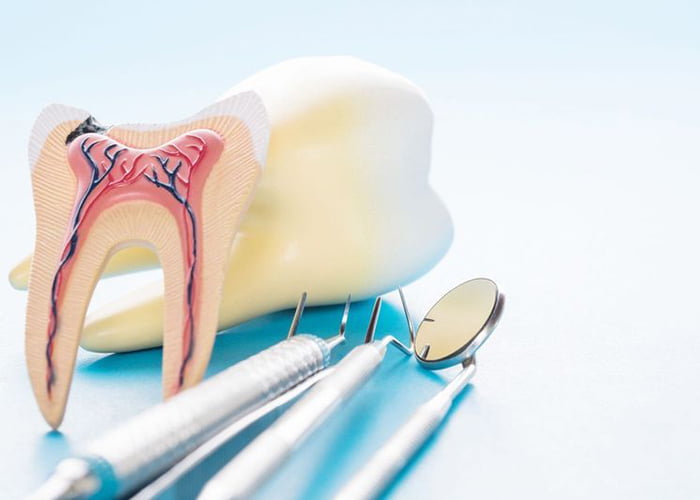If you recently had a root canal, it’s natural to have questions. We are here to handle any questions you have, including how to care for your root canal tooth after your procedure.
Don’t stress about sensitivity
You may have noticed that your teeth are a little more sensitive than usual. This is perfectly normal and nothing to stress about. A little soreness is likely to occur after the procedure, but general sensitivity should subside within a day or two. The sooner you get the infection completely eliminated, the faster your body will be able to regenerate itself, and you will feel your original self again within a week.
If the sensitivity persists or becomes severe, contact your dentist.
Wait until you have your permanent crown before you chew on the area.
Root canal treated tooth normally requires a crown. Your dentist will likely place a temporary crown on the tooth while the permanent crown is being made. It’s important to wait until you have your permanent crown before you chew on the area. The temporary crown is not as strong as the permanent crown and can come off if you chew on it too hard. If the temporary crown does come off, be sure to see your dentist right away so they can put it back on or place a new one.
Brush and floss normally
When you undergo a root canal procedure, don’t neglect your teeth by refraining from cleaning them normally. Gum disease is the last thing you should experience after a root canal treatment.
It’s no secret that good oral hygiene habits like brushing and flossing can help keep your teeth and gums healthy. Brushing and flossing remove plaque, a sticky film of bacteria that forms on teeth. Plaque can cause cavities and gum disease if it’s not removed. But plaque can also release toxins that enter the bloodstream and contribute to inflammation. Inflammation is linked to a number of chronic diseases, including heart disease, stroke, and diabetes.
So make sure to brush and floss regularly! It’s good for your teeth AND your health.
Use warm salt water to soothe the area
Before your tooth feels better, refrain from drinking cold water. One of the best things you can do to ease any discomfort and help your gums heal is to rinse with warm salt water.
Here’s how to do it: mix 1 teaspoon of salt in 8 ounces of warm water, and swish it around your mouth for 30 seconds. Spit it out and repeat as necessary. The saltwater will help reduce inflammation and speed up healing.
Root canals can be unpleasant, but luckily there are ways to ease the discomfort and promote healing. So don’t forget the salt water rinse!
Protect your teeth from damage
A mouthguard is a crucial piece of safety equipment for anyone who regularly participates in activities where there is a risk of impact to the mouth. Whether you are playing organized sports like football or hockey, or just skateboarding around the neighborhood, a mouthguard can help protect your teeth from being knocked out or fractured.
Schedule follow-up exam
After a root canal, it is important to have a follow-up exam with your dentist. This is because there is a small chance that the infection could return. During the follow-up exam, your dentist will check to make sure the root canal was successful in treating the infection.
If you have any pain or other symptoms after a root canal, be sure to see your dentist right away. It is important to treat any infections promptly to avoid further damage to your teeth and gums.
Be sure to keep that appointment because it is an essential part of your treatment. We will also place a permanent crown to reinforce your affected tooth.
See Dentist For Life
Looking for an experienced and trusted dentist in Marysville, Ohio? Look no further than Dentist For Life! We provide comprehensive dental care for patients of all ages. We take a wide variety of insurance plans and are currently accepting new patients. You can reach us at (937) 707-1111 or schedule your appointment online here.



